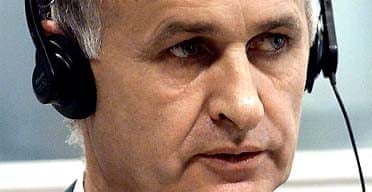The Yugoslav war crimes tribunal today sentenced General Radislav Krstic to 46 years in prison for the crime of genocide against the Bosnian Muslims.
The court ruled that Bosnian Serbs committed genocide at the UN-protected enclave in Srebrenica in July 1995.
The court ruled that the Serbian forces killed up to 8,000 Bosnian Muslims of fighting age, after expelling all the women, children and old people from Srebrenica in Europe's worst civilian massacre since the second world war.
They must have known that the combined action of killing and expulsion would lead to the destruction of the Muslim population, and therefore constituted genocide, the judgment said.
The panel of three UN judges ruled that even though Krstic may have received orders from others to carry out mass executions of men and deportations of women and children, he bore responsibility for genocide.
"You were there, General Krstic," said Judge Rodrigues.
"You were guilty of the murder of thousands of Bosnians Muslims," he said.
Krstic, the highest-ranking Bosnian Serb military officer tried by the court, had pleaded not guilty to eight counts, including genocide and crimes against humanity.
He had told the court that he knew of the mass killings, but was unable to stop them. He pleaded innocent to genocide, murder, persecution and other charges.
The tribunal's statutes defines genocide as "acts committed with intent to destroy, in whole or in part, a national, ethnical, racial or religious group."
Those acts include murder, inflicting living conditions designed to eliminate a group, preventing births or transferring children from one group to another.
In July 1995, Serb forces attacked the UN-declared "safe haven" where about 30,000 Muslims had sought refuge from the Serb onslaught at a Dutch-manned UN base. Exhumations of mass graves conducted by investigators in Bosnia, some as recently as last month, have revealed the bodies of more than 4,000 victims.
Women and children were separated from the males, who were loaded onto buses and taken to collection stations throughout the region.
Dozens of survivors testified about what became known as the killing fields of Srebrenica. Several witnesses told how they lay in a field of bleeding corpses for hours as Serb soldiers discharged round after round of automatic weapon fire into columns of prisoners.
Krstic told the court that his immediate superior, General Ratko Mladic, took control of the forces that overran the enclave just days before the killings. Krstic said he kept quiet for fear that Gen Mladic would harm his family.
But prosecutors maintained that Krstic jointly masterminded the genocide plan with Mladic and Radovan Karadzic, then the Bosnian Serb political leader. Both Mr Mladic and Mr Karadzic have been indicted but remain at large. The UN court for Yugoslavia was established in 1993 to punish those responsible for atrocities during the break-up of Yugoslavia that began in 1991.
The Krstic trial began in March 2000. The trial heard 102 prosecution and 12 defence witnesses during 94 trial sessions, but was delayed frequently because of Krstic's health problems related to the amputation of a leg during the war.
Although the Rwanda war crimes tribunal has handed down eight genocide convictions for the 1994 bloodbath in that African country, it was the first time a case of genocide has been convicted in Europe since it was defined by the UN genocide convention in 1948.
Related articles
01.08.2001: Police chief admits Bosnian atrocities
04.07.2001: Does the defendant want to hear 32 pages of charges? 'That's your problem'
02.07.2001: The Hague tribunal's top targets
Useful links
International Criminal Tribunal for the former Yugoslavia
